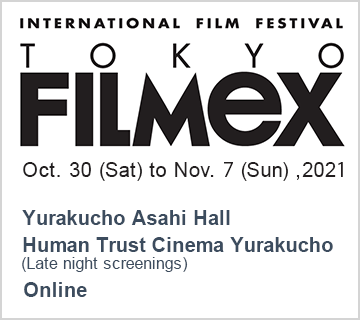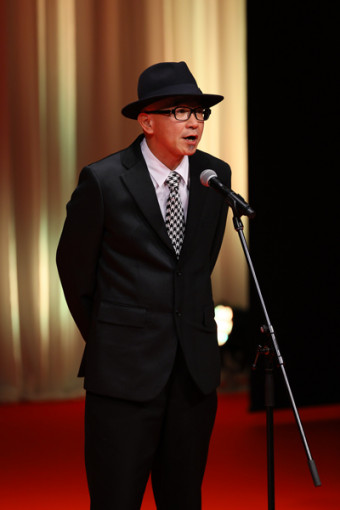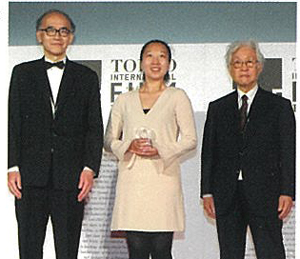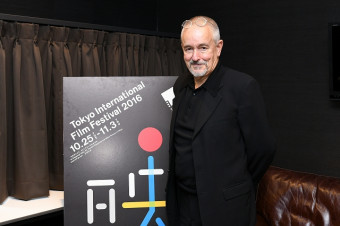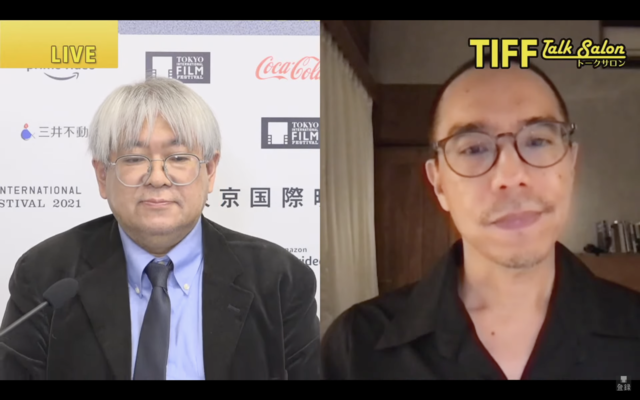
Thai auteur Apichatpong Weerasethakul has fashioned a career with work that explores modern humanity’s connection to the spirit world, a term he defines loosely. Narratively open-ended and formally austere, his films tend to dissolve the interface between nature and civilization to the point where it’s difficult to tell where one ends and the other begins. In his latest, Memoria, which is screening in the Gala Selection of the 34th Tokyo International Film Festival, he explores this frontier through sounds, which, as implied by the film’s title, always contain elements of the past.
Speaking online from Chiang Mai, Thailand, at a Talk Salon Q&A session with TIFF Programming Director Ichiyama Shozo, the director explained the use of sound. “The film is about this one character who listens to sounds, and the viewer is meant to sync with that,” he said. “It just reflects the way I appreciate the world: I don’t listen to music so much anymore because what we have in terms of everyday soundscapes is rich to begin with, and memories are activated by that.” He added that he wants viewers in the theater to be distinctly aware not only of the sounds coming from the screen, but also their surroundings. He thinks that having the audience “understand the illusion of the movie” as they’re watching, it can be a “liberating” experience.
The character he mentioned, played by Tilda Swinton in their first collaboration, is Jessica, an orchid breeder living for an extended period in Colombia, where her sister also lives. Jessica has trouble sleeping, and then hears a sudden loud thud one night that seems to come from nowhere. Throughout the film she occasionally hears it again, though nobody else does. She even goes to a doctor to see if there’s something wrong with her, and leaves with a prescription for antidepressants, which she seems to want though she isn’t sure it’s what she needs.
But as with all of Weerasethakul’s films, fixating on story can distract the viewer from his actual aim, which is more difficult to pin down. His reasons for making Memoria the kind of film which seem to have more to do with the circumstances of its creation. He told Ichiyama that he’d always wanted to work with Swinton, and it became a matter of where they should make a film together, Scotland or Thailand? In the end, they decided on Colombia, mainly because, “We embraced the idea of not knowing a place and then exploring it.”
But Weerasethakul’s decision to film in the South American country apparently wasn’t purely random. “I feel a connection to Bogota and the architecture and the people. In 2017, I traveled around the country, collecting stories about trauma and happiness and how people process memories. Certain spots in the city or in the mountains stayed with me on a personal and a social level.” He also felt freer in Colombia. “In Thailand I’m always running around approving this or that, but in Colombia I could just lose control. I could allow all the partners on the film to share their ideas with me while I focused on the heartbeat of the film. In post-production I let the film express what it wanted to.”
Another aspect of the setting that intrigued him was the weather. Rain, especially the sound of rain, sets the overall mood of Memoria. “In Bogota, the weather is really temperamental,” he said. “It can shift a lot during the day—wind, rain, sun. People have to prepare for all that, and that appealed to me, because I had to anticipate all these weather patterns. As the movie progresses, the rain becomes something else. Listening to the rain in the dark to me is associated with memory, each drop a memory and all flowing together.”
For Jessica, the sounds at first are disturbing, and mirror a sense of displacement that prompts her to question her mental stability. “I think I’m going crazy,” she says to an acquaintance at one point, after several dissociative episodes that leave her at loose ends. “It’s not the worst thing to be,” replies her friend, and by the end of the film, Jessica has accepted that these sounds have always been there. It’s just that she wasn’t listening carefully enough.
“In the end, the character doesn’t really exist anymore,” said the director. “It’s like it was in my earlier movie Tropical Malady. They just become integrated into nature, becoming one more element.” Another character in Memoria simply “stops,” as Weerasethakul puts it, in front of Jessica, who asks him afterwards what it’s like being dead. But that, according to the director, is not what really happens when we’re one with nature. “That’s the key for Jessica, to just stop being so that she is at peace.”
Both Ichiyama and one of the online viewers were curious about a pointed reference to Tokyo in the film. Jessica and a sound engineer she’s sought out to explain the thud talk about the engineer’s music group. He says his dream is to someday bring his group to play in Tokyo. Weerasethakul says that whenever people in Colombia talk about Asia, they usually mention Tokyo, thus indicating to him that it’s the most famous Asian city.
He added that he hopes to come to Tokyo in the spring when Memoria opens in theaters here. “Maybe the reason I mention Tokyo in the movie is because I miss it,” he says. “I have many friends there, and my career really started in Yamagata (the Yamagata Documentary Film Festival). That’s why I feel honored that my new film is being shown at TIFF.”
Ichiyama reminded him that later this week he would also be participating remotely in an Asian Lounge discussion with the Japanese actor Nishijima Hidetoshi. “Yes, I just saw him in Drive My Car in New York,” said Weerasethakul, “and it was very perplexing for me, so I have lots of questions for him.”
TIFF TALK SALON
Memoria (Thailand): Gala Selection
Guest: Apichatpong Weerasethakul (Director/Screenplay/Producer)






